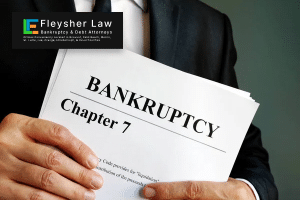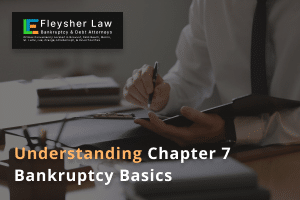This page was written, edited, reviewed & approved by Emil J. Fleysher following our comprehensive editorial guidelines. Emil J. Fleysher, the Founding Partner, has 15+ years of legal experience as a bankruptcy attorney. Our last modified date shows when this page was last reviewed.

Filing for Chapter 7 bankruptcy is a crucial step for anyone struggling with debt. It's a legal process that helps individuals discharge most of their unsecured debts. The entire process usually takes about four to six months, from filing to discharge. On the other hand, the exact timeline can shift based on individual circumstances and court schedules.
At Fleysher Law, we have in-depth knowledge of bankruptcy law and can be your representative in bankruptcy court. If you are seeking debt relief, reach out to us before you file for bankruptcy. Our bankruptcy attorney can protect your rights and advocate for your interests. Reach out to us to schedule a free consultation.

Chapter 7 bankruptcy offers a clean slate for those overwhelmed by debt. It's often known as "liquidation bankruptcy." In many cases, some of your assets can be sold to pay off debts in this process. However, state and federal laws exempt many types of assets from liquidation.
Chapter 7 bankruptcy creates an opportunity for filers to discharge most of their unsecured debts. This means you can eliminate debts like credit card debt, medical bills, and certain personal loans. However, some debts like student loans, child support, and certain tax obligations can't be discharged. This process provides relief from debt collectors and can offer a path to financial stability.
In Chapter 7, a bankruptcy trustee is named to oversee your case. They will evaluate your assets and determine if any can be sold to pay creditors. Many individuals who petition for Chapter 7 can keep most of their property thanks to exemptions. It's a legal way to reset your financial situation when you're unable to pay or settle your debts.
To file for Chapter 7, filers must meet certain criteria. These criteria ensure that the process is fair and accessible to those who truly need it. Understanding these requirements is crucial before starting the bankruptcy process.
Understanding these criteria helps you assess if Chapter 7 is right for you. Meeting these requirements is the first step in your journey to financial freedom.

Filing for Chapter 7 bankruptcy starts with gathering the necessary information. You need to collect detailed financial records, including your income, debts, assets, and expenses. Accurate and complete information is crucial for a successful filing.
You must gather documents like tax returns, pay stubs, bank statements, and a list of assets and debts. These documents give a complete picture of your financial situation. They help the court and trustee understand your ability to pay debts.
Before filing, you must complete a credit counseling course. This counseling must come from an agency approved by the U.S. Trustee Program. The counseling helps you understand the implications of bankruptcy and explores debt relief alternatives.
After completing counseling, you'll receive a certificate. You must file this certificate with your bankruptcy petition. It's proof that you've met this requirement, a crucial step in the process. Reach out to us for help with this step.
Filing the bankruptcy petition is a critical step. The petition includes forms that outline your financial situation. These forms cover your assets, debts, income, and expenses. Accurate and honest information is essential for a successful bankruptcy.
After filing, the court will schedule a 341 meeting of creditors. This meeting usually happens about a month after filing. During this meeting, creditors can ask questions regarding your finances and bankruptcy forms.
The trustee also asks questions to ensure all information is accurate and complete. This meeting is a key part of the process. It allows for the verification of information and clarification of any issues.

Once you file, an automatic stay is implemented on your behalf. This stay blocks most collection actions against you. Creditors can't initiate or continue lawsuits, wage garnishments, or even phone calls demanding payments.
The automatic stay gives you temporary relief during the bankruptcy process. It's a crucial protection that allows you to focus on your bankruptcy case without outside pressures.
In Chapter 7, the trustee may liquidate certain non-exempt assets. The proceeds from these sales go to paying your debts. However, many assets, like your primary residence or car, are exempt and can be kept, depending on your state's exemption laws.
The trustee oversees the liquidation process and ensures it's fair and in accordance with bankruptcy laws. Most Chapter 7 filers find that they can keep most, if not all, of their property.
The trustee plays a crucial role in Chapter 7 bankruptcy. They review your financial information and oversee the liquidation process. The trustee also conducts the 341 meeting and ensures that creditors are treated fairly.
The trustee's role is to ensure the bankruptcy process runs smoothly and legally. They work to protect the interests of both you and your creditors.

The discharge of debts usually occurs about four months after filing the bankruptcy petition. This discharge means you're no longer legally required to pay the discharged debts. It's the goal of filing for Chapter 7 and marks the start of your financial fresh start.
However, not all debts can be discharged. Debts like student loans, child support, and certain taxes remain your responsibility. Understanding what debts can be discharged helps set realistic expectations for bankruptcy outcomes.
Delays can occur in the Chapter 7 process, but you can take steps to avoid them. Being prepared and informed is key to a smooth bankruptcy process.
Avoiding these common pitfalls helps ensure a smoother, faster bankruptcy process. Being proactive and attentive can make a significant difference in your case. The sooner you reach out to us, the quicker we can help you take control of your situation.
Consider seeking legal assistance early in the process. A bankruptcy lawyer can help you review your options and guide you through each step. They can also ensure you meet all legal requirements and deadlines.
Legal assistance is especially valuable if you have a complex financial situation. An attorney can help navigate challenges and provide crucial advice. They are an important resource in achieving the best possible outcome in your bankruptcy case. That is where our team can help you. At Fleysher Law, we are here to advocate for your rights and represent your interests. Contact us today to schedule your case consultation.

If you're considering Chapter 7 bankruptcy, Fleysher Law can help. We offer personalized guidance through every step of the process. Our expertise can make your bankruptcy journey less stressful and more successful.
Contact us today for a consultation. We're here to help you achieve a fresh financial start. Let us guide you towards a future free from overwhelming debt. Fleysher Law is your partner in navigating the path to financial freedom.

Emil specializes in consumer bankruptcy, debt settlement, and mortgage modification, offering a holistic approach to solving mortgage and debt problems. Emil listens to clients, understands their circumstances and goals, and helps them make the right choices by presenting all options and contingencies.
He is dedicated to helping South Floridians regain their financial freedom from overwhelming debt caused by high interest credit cards, bad mortgage loans, and uninsured medical expenses.

"*" indicates required fields